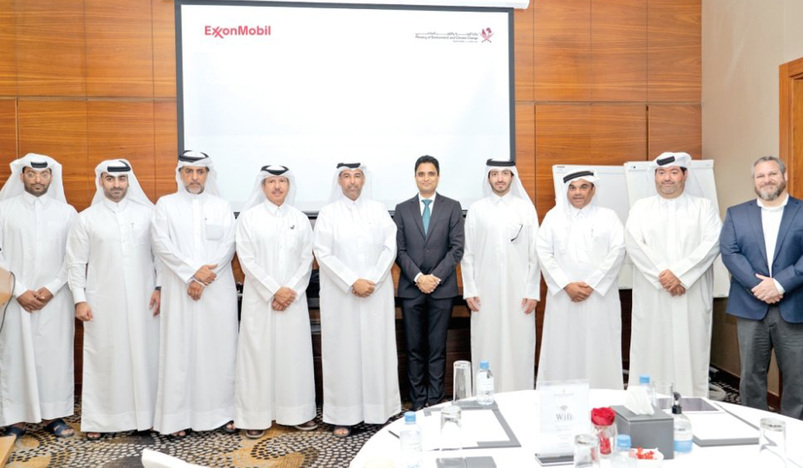
Coral Reef Restoration Workshop
The Ministry of Environment and Climate Change organized a workshop for partners involved in restoring coral reefs, in cooperation with ExxonMobil Research Qatar, in presence of HE Minister of Environment and Climate Change Sheikh Dr. Faleh bin Nasser bin Ahmed bin Ali Al-Thani and a number of senior officials from both sides.
The workshop aims to share previous and ongoing activities related to coral reef restoration, identify and document areas of common interest in coral reef research, management, and conservation, and exchange experiences between those concerned with coral reef protection for direct, effective, and purposeful communication amongst each other, in addition to the documentation of the current status of coral reef restoration activities, future cooperation and communication between the Ministry and ExxonMobil Research, and the agreement to take concrete steps in the future.
The Assistant Undersecretary for Protection Affairs and Natural Reserves Dr. Ibrahim Abdullatif Al Maslamani stressed that the State of Qatar, represented by the Ministry of Environment and Climate Change, has attached utmost importance to programs that support the preservation of biodiversity, most important of which are marine projects such as the coral reef protection.
He explained that the workshop sheds light on the importance of coral reefs; Being the oldest ecosystem on earth, and one of the most important and productive marine habitats in the Gulf region, its existence is very vital. Coral reefs provide shelter and sanctuary for more than a quarter of known marine species and, economically, contribute to the revitalization and development of tourism in more than 100 countries worldwide.
He pointed out that among the Gulf countries, the State of Qatar is the richest in coral reefs, with about 48 percent of the total population in the Arabian Gulf region. Its eastern and northern coasts are distinguished by a remarkable richness and high density of coral reefs.
He added that due to the climatic conditions, including increased salinity and global warming, the average temperature range of the coral's environment increased, leading to its death after undergoing bleaching.
The Assistant Undersecretary for Protection Affairs and Natural Reserves stressed the importance of community partnership, and the great trust in science and scientists in what they can offer to restore coral reef ecosystems, noting the role of ExxonMobil Research Center and its participation in organizing such workshops with an important regional and international dimension, and for its efforts to modernize the elements of coral reef restoration and present the findings of scientific research in this field.
For his part, the Vice President and Ventures Manager at ExxonMobil Qatar Jagir Baxi stressed the importance of this workshop, pointing out that coral reef restoration plays an active role in preserving the biodiversity of the marine ecosystem.
He pointed out that ExxonMobil's active participation in restoring environments and preserving biodiversity comes to support the efforts of the State of Qatar in preserving the environment, explaining that the objectives of this workshop are in line with Qatar National Vision 2030, the National Biodiversity Strategy and Action Steps, and the Global Biodiversity Framework for Action and the Post-2020 Global Biodiversity Framework of Action issued by the United Nations.
(QNA)
.jpg)
Qatar Secures Place Among the World's Top 10 Wealthiest Nations
.jpg)
Hamad International Airport Witnesses Record Increase in Passenger Traffic

Saudi Arabia: Any visa holder can now perform Umrah

What are Qatar's Labour Laws on Annual Leave?
Leave a comment